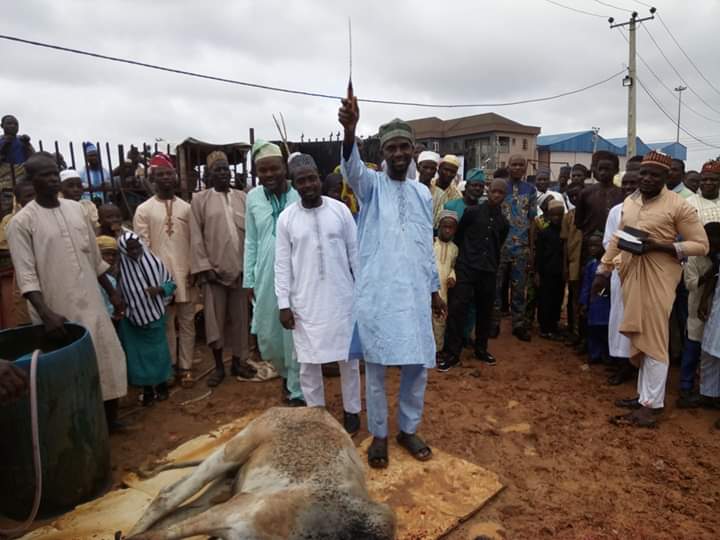Slaughtering of animals is one of the rites of Eid-ul-Adha and it’s traditional for adherents to see the Imam raise the knife after slaughtering at the Eid ground.
Muslim News investigations revealed that it is part of the etiquettes of Eid for Muslims to witness the slaughtering of the ram by the Imam before Muslim faithfuls can slaughter theirs.
Anybody that slaughters his ram before the Imam has not slaughtered for the sake of Eid. Hence, it will not be accepted by Allah.
Confirming this, Prophet Muhammad (Allah’s peace be upon him) said in an authentic narration, “Whoever slaughtered his sacrifice before the Imam, let him slaughter another in its place, and whoever didn’t slaughter a sacrifice, let him do so in the name of Allah.”
Its significance
In Islam, animal slaughtering is symbolic, confirming the obedience and submission to Allah as exemplified by Prophet Ibrahim. Allah (SWT) dedicates a surah (chapter) to Prophet Ibrahim (Abraham) in the Qur’an (chapter 14), where the story of Ibrahim’s willingness to sacrifice his son, Ismail, when God ordered him to do so, was narrated.
The story of Ibrahim and Ismail
The Prophet Ibrahim (May Allah’s peace be upon him) was without offspring until he clocked 70. Despite being childless, he remained steadfast on the Path of Allah, until Allah granted his prayers.
The noble Qur’an narrates, “My Lord! Grant me (offspring) from the righteous.”
Allah (SWT) gave him glad tidings of a forbearing boy, named Ismail.
“And, when he (his son) was old enough to walk with him, he said: O my son! I have seen in a dream that I am slaughtering you (offering you in sacrifice to Allah). So, look what you think!”
He said: “O my father! Do that which you are commanded, in sha’Allah (if Allah wills), you’ll find me of As-Sabirun (the patient).
The verses continue, “Then, when they had both submitted themselves (to the Will of Allah), and he had laid him prostrate on his forehead (or on the side of his forehead for slaughtering);
We called out to him; Ibrahim, you have fulfilled the dream! Verily, thus do We reward the Muhsinun (good-doers)…And We ransomed him with a great sacrifice (a ram).” Surah As-Saffat (Q37: 100-106)
That is the story of Eid-ul-Adha, the second most important festival in the Muslim calendar after Eid-ul-Fitr; how Allah, in His Majesty, replaced the slaughtering of Ismail with a ram for Ibrahim at the time of sacrifice.
Generations after generations, Allah raised Prophet Muhammad (peace be upon him), the seal of all Prophets and Messengers, from among the Arabs, the progeny of Ismail and Ibrahim.
Prophet Mohammad (peace be upon him) was also asked by his Companions about Qurbani (the sacrifice of Eid), he said; “It is the Sunnah (Path) of your father, Ibrahim (A.S).”
Following Allah’s injunctions…
It is very important to understand that the sacrifice itself, as practiced by Muslims, has nothing to do with atoning of sins or using the blood to wash ourselves from sin.
This is a misunderstanding by those of previous generations: That’s why Allah says; “It is neither their meat nor their blood that reaches Allah; it is your piety that reaches Him.” (Qur’an 22:37)
Every Muslim is expected to exhibit piety, especially when it comes to sharing of the ram meat.
The meat should be shared according to Islamic injunctions, specifically between three people; one’s own family, friends and the poor, who could not afford to buy.
It is however disheartening to see today’s Muslims who ignore this ruling and follow their self desires.
While some harbour the meat for a number of days, while it’s expected to be distributed within three days, others run into debt all in the name of slaughtering rams, whereas Allah does not place any burden on His servants.
Prophet Muhammad (SAW) slaughtered three rams, where he said,“One for me and my family, another one for my Companions and the third for my ummah (community) who can’t afford to slaughter a ram.”
Eid Mubarak to all our esteemed readers and fans across the world.


